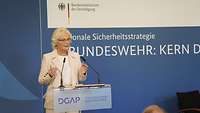
Policy Speech on the National Security Strategy
Policy Speech by Federal Minister of Defence on the National Security Strategy of the Federal Republic of Germany12 September 2022 Berlin.
- Date of publication

In her first policy speech on Germany’s first National Security Strategy, Defence Minister Christine Lambrecht called for a culture change in security policy. She said that in the context of the “Zeitenwende”, change was the order of the day, with the Bundeswehr at the heart of German security.
The Minister spoke at an event hosted by the German Council on Foreign Relations in Berlin on 12 September, titled Security and Defence Policy: Implications of the “Zeitenwende” for Germany’s first National Security Strategy. According to Lambrecht, military security had to once again be recognised as “a key task of this country”, a central public service provided by the state – especially in light of the war in Ukraine and the considerable changes to Europe’s security that it had brought. Security was to be considered beyond ministerial divides, she added, as a coherent concept, just as suggested by the notion of an integrated approach to security, which was postulated in the National Security Strategy.
The Minister conceded that such a National Security Strategy had long been overdue as a tool to provide guidance and orientation. “The National Security Strategy is an important project. The urgent strategic questions require more than just good crisis management and quick responses. They require long-term policies, well-founded and soundly financed. And most importantly, one thing is needed in Germany, from all of us, and that is change”, Lambrecht said in her 30-minute speech at the Council on Foreign Relations. Particularly for the Bundeswehr, this paradigm shift in political thinking and acting called for a more central role in the future. She asserted that “we must return to seeing the Bundeswehr as an organisation that provides an essential public service – every day”.
The Minister advised that lessons from Russia’s brutal attack on Ukraine had to be drawn for Germany’s ability to defend itself: “We, too, need strong, combat-ready armed forces so that we can defend ourselves and our Alliance, if need be.” That was why over the past weekend she had once again consulted with Germany’s Chief of Defence General Eberhard Zorn on additional options for supporting Ukraine. She said that she agreed with NATONorth Atlantic Treaty Organization Secretary General Jens Stoltenberg about the Bundeswehr’s commitment to meeting the targets decided at the NATONorth Atlantic Treaty Organization Summit in Madrid. These included, for example, strengthening NATONorth Atlantic Treaty Organization’s eastern flank.
Lambrecht applauded Germany’s quick and decisive action in response to the war in Ukraine through the adoption of a special fund for the Bundeswehr worth 100 billion euros. This sum would be invested in the operational readiness and combat power of the German armed forces. She also pointed out the sustainability behind this special fund.
Lambrecht explained that at its heart, the debate on the National Security Strategy was about how Germany understood its role “as a nation, as a neighbour, as a democracy, as an ally”. “Germany’s size, its geographic location, its economic power, in short: its heft makes it a leading power whether we want to or not”, she said, adding that this included the military domain. National prestige, however, was by no means a motivation for this role. She alluded to both the great responsibility this role entailed and to the questions that Allies were posing about the capabilities of the Bundeswehr, saying that the National Security Strategy would have to provide answers to these questions. Germany could “build trust by taking a stand, being prepared, contributing substantially, being present, sharing burdens.” “The most important message I have for you today is this: Germany can do this”, she said emphatically.
Germany’s first National Security Strategy would now be written in the spirit of “level-headed and judicious commitment”. This was the first time the country was formulating such a grand strategy, which was to provide orientation on the security situation and its implications. Lambrecht wished for the new Strategy to be clearly communicated to the German public: it would be a National Security Strategy for the people. In this context, she proposed a national security day in the Bundestag.
The strategic situation was characterised by the insight that the United States could no longer guarantee the defence of Europe to the same extent as in the past. However, the Minister also made clear that from a European standpoint there was no alternative to the nuclear deterrence provided by the US. Despite this, she placed the onus on Europe to lighten the burden on the US and to do more for its own defence. The EUEuropean Union’s Strategic Compass and NATONorth Atlantic Treaty Organization’s new Strategic Concept were important milestones on this journey. She called for an even stronger European pillar in NATONorth Atlantic Treaty Organization, saying that “We Europeans, and before anyone else that means we Germans, must make more efforts towards credibly projecting enough military strength that other powers will not even think about attacking us”.
With regard to the Bundeswehr, the focus would in future be on national and collective defence she said, but crisis management would continue to play a role. Germany was planning to field three operationally ready and combat-capable army divisions by the 2030s. They would be “fully equipped, with three brigades each, plus additional forces”.
In no uncertain terms the Minister concluded that Germany would have to spend even more on defence if the task of providing security was to succeed and the “Zeitenwende” was to be sustainable.
Author: Jörg Fleischer